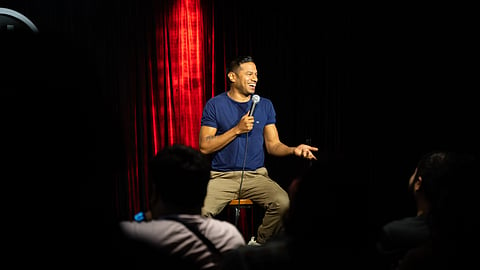Daniel Fernandes is in Hyderabad with a stand-up special about the ‘lessons’ he has learnt
Comedy as an art form has been used for entertainment since the time of emperors. From courtroom jesters to stand-up comics, this medium often addresses social issues while making people laugh. As Daniel Fernandes brings his stand-up special Lessons to the city, we speak to the artiste about the show, creative freedom and how social media has changed the artform.
Excerpts:
1. What are you going to perform in 'Lessons'? What themes are you touching on?
Lessons is a new format I am trying out, which I want to reveal directly to the audience. It's always exciting to try something different. In terms of themes, we'll be touching upon life itself, our greatest teacher. I'm going to try and make this as fun as possible with my signature style
2. Where did you get inspiration from for this particular show?
The inspiration came from a desire to stand out. There are so many brilliant comedians from all over the world doing amazing work, and all of us are plying our trade in this gigantic marketplace, so I'm trying to see if I can create something unique and have fun while I'm at it.
3. Why have you titled it lessons?
Because that's what the show is about.
4. What was your creative process while writing it?
My creative process involves eating the right vegetables and letting my imagination run wild. I plan to do this with Lessons as well
5. Do you think comedy is a suitable platform to convey social messages?
Irrespective of the genre, while art is escapist in nature, it has also been used to make a point. Hundreds of years ago, there were court jesters in kingdoms who would make fun of society, and sometimes even the King, in order to entertain and maybe shine a light on something that people should be paying attention to. I think that is what modern day satirists represent. We're the court jesters who are just trying to make sense of the chaos we're all living in. We're not meant to be taken seriously.
6. You have been pretty vocal about your opinions. How do you think should an artiste, especially a comedian, balance creative freedom and artistic responsibility?
"Artistic responsibility" is such a heavy term. We're clowns with a microphone. Comedy should be a refuge, where everyone gets to let loose and have a laugh, and for those few minutes or hours, everything else in the world just fades into the background. Trying to police artists by burdening them with responsibility is counterproductive to the creative process. Every human being has a compass within themselves, and just like the audience can use this compass to choose what art they consume, let the artist use theirs to create said art
7. Do you think there should be censorship in art?
Censored art is not art anymore, it's propaganda. In a civilized and intelligent society, artists are accorded a certain level of respect because they see the world in a unique way and express that vision through their art. If the art triggers a strong response, the audience is welcome to debate it and even outright reject it if they so please but art should never be basis for censorship (or threats of any kind).
The themes of sex, drugs and violence regularly feature in movies, music and paintings yet they exist because consuming them comes with the understanding that these representations are purely for entertainment. It's the same thing with comedy. Why are people so afraid of being intellectually challenged? If you find something funny, laugh. If you don't, watch something else. Life is that simple.
8. Do you think social media has changed the way comedians approach their art?
Oh yes! India wouldn't have a comedy scene if it wasn't for social media. Thirty years ago, in the US you had to be discovered in a comedy club, be offered a spot on a late night show, off the back of which you could hopefully get to go on tour or maybe land yourself a sitcom or movie role and that was it. Very few comedians made it that big, and the ones that didn't struggled to make rent.
Social media opened the entire world up as a market for both comedians and the audience. It's a very direct to consumer approach now and because of that, the traditional gatekeepers do not enjoy the same power they used to, and a lot of comedians are now able to make a decent living for themselves even if they are not necessarily famous.
The downside to this dependency on social media is that after a point you're just a slave to an algorithm and it's very easy to lose yourself in that race which is why it's important to use the system for you and not against you.
9. There has been a deluge of comedians in the past few years. What would you say is your USP? What makes Daniel, Daniel?
My USP is intelligent, biting sociopolitical humor.
10. You have travelled to multiple cities with your work. What difference do you find in the audiences of each, and how does the audience of Hyderabad look like to you?
Every city has it's own personality and energy. Hyderabad has this raw enthusiasm you don't often see at comedy shows in other cities. Whether it's laugher, applause or even an unintended heckle, there's always something extra (in a good way). My last show there was one of the best of that tour and ended in a standing ovation so I'm really looking forward to both my shows this Sunday,

